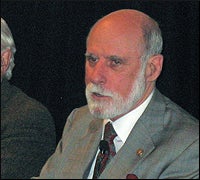 |
Vint Cerf Source: David Needle |
PALO ALTO, Calif. — Vint Cerf, widely credited with being the father of the Internet, says journalism has to explore new models to take advantage of the ubiquity of the Web and and get beyond the huge overhead that is hurting conventional media, particularly newspapers.
Cerf, who is currently chief evangelist at Google (NASDAQ: GOOG), gave the keynote address here today at an Innovations in Journalism conference on the Stanford University campus.
During a Q&A session, Cerf was asked how online publications can make enough money competing with so many free sources of information. He noted Google doesn’t charge for services like Gmail, Google News and its main search engine, which are ad-supported. But paid content might also have a role.
“Exploring alternative forms of distribution is absolutely essential,” said Cerf. He suggested content producers might need to take a page from the success of Apple’s (NASDAQ: AAPL) iTunes store which made individual tracks available for low cost – 99 cents – so consumers didn’t have to buy entire albums. Likewise, content might be sold on a more micro level. “If there’s no way to reward intellectual property, it will be difficult to come by,” said Cerf.
Unlike traditional media, which wrestles with fitting stories on a page or how much time there is in a given broadcast schedule, Internet content is real time, not space constrained, interactive and multimedia.
“On the Web, you have the possibility of exploring what other people think and there is an immediacy that’s completely different than newspapers or broadcast schedules,” he said.
He also said Google has built an enormous business based on providing ad value and there may be lessons there for traditional media looking to make it online, particularly in the way content can be so targeted to reader’s personal interests.
“Journalism can take advantage of this technology and perhaps Google will have a role there,” he said.
Is everyone a reporter?
But the Internet has also greatly expanded the notion of what is news.
Content producers compete with Twitter, social networks, YouTube and instant messages. He also noted there are over 3.5 billion cell phones in the world and a large percentage have cameras.
“It’s like almost everyone has the capability to be a reporter,” said Cerf.
With this mass of information, he said branding is more important than ever because users want trusted sources of information to guide them to what’s important and reliable content.
“The Internet enhances the value of critical thinking, otherwise we’re just awash in information,” said Cerf. “People’s trust in journalism has always been about branding, it’s still fundamental to compete.”
On the question of security, Cerf said the Internet has spawned an ironic juxtaposition of security and transparency. “Privacy is evaporating rapidly, but on the other hand that lack of privacy induces transparency.”
In other words, in Cerf’s view, we have we have less privacy, but at least there’s a greater chance to see what everyone’s up to.
Cerf also gave an impassioned plea in favor of net neutrality, specifically universal access to broadband.
“I would say a neutral broadband is a first amendment right,” he said. “The freedom to speak about what our government is doing is fundamental and communications needs to stay open.”


